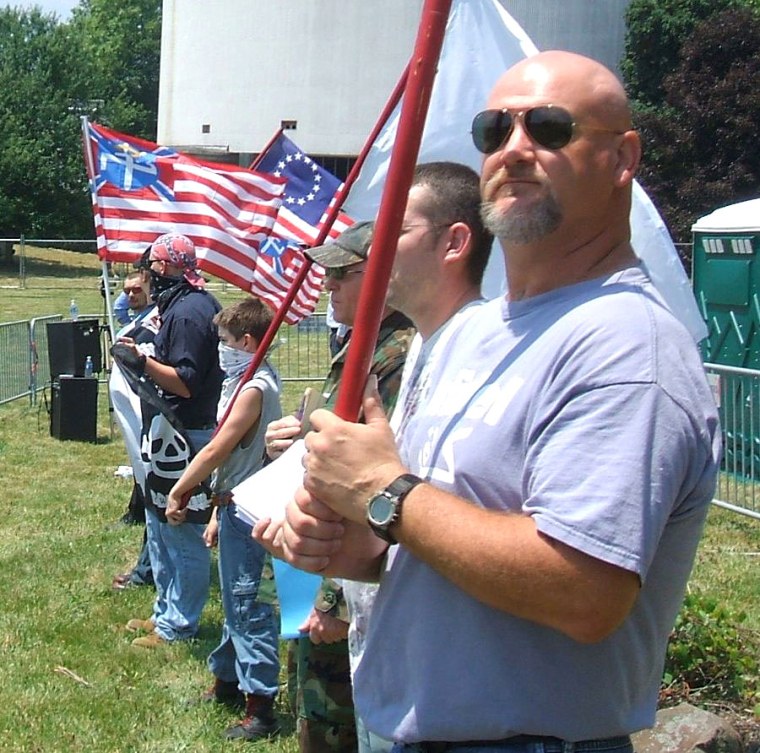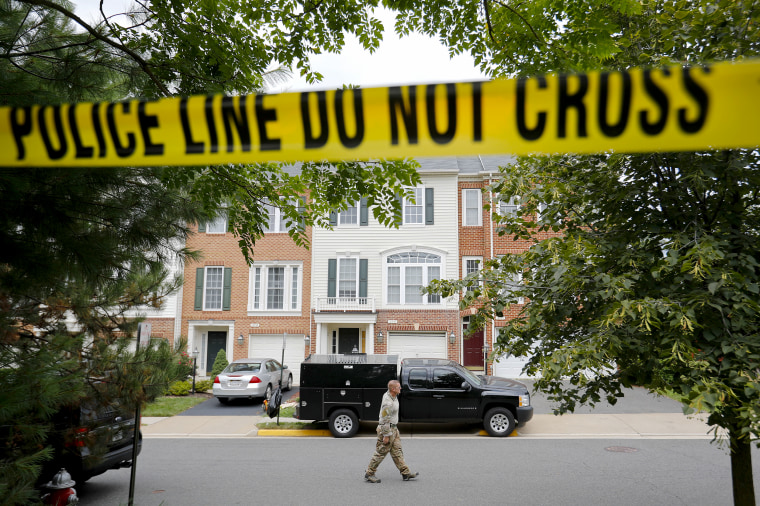WASHINGTON — Several years ago, the FBI began separate terrorism investigations of two white, middle-aged government workers in the D.C. area who appeared to be violent extremists.
Virginia Transportation Department employee Douglas Story was an Aryan Nation member who wrote that he wanted to see President Barack Obama shot in the head, court records say. Ultimately, Story was sentenced to 12 months in jail after pleading guilty in 2012 to obtaining an illegal machine gun.
Washington transit police officer Nicholas Young was also a white supremacist, but he became enamored of the Islamic State terror group, praising their brutal tactics, according to court records. After a six-year investigation involving extensive surveillance and multiple informants, Young was convicted in 2019 of buying $245 in phone cards intended to help ISIS.
He got 15 years.
The outcomes of those criminal cases — and the disparity in resources devoted to them — are a stark illustration of how the law and its enforcers have dealt differently with domestic terrorism suspects compared to Americans who pledge allegiance to jihadi-inspired international groups, according to experts and former FBI officials who worked the cases.
In the wake of the Jan. 6 Capitol riots, amid a recognition that political violence is spiking in the U.S., the Biden administration is now looking at how to overhaul the federal government's approach to domestic terrorism, now considered a top threat to the homeland. The attack on the Capitol fits the legal definition of domestic terrorism, the Congressional Research Service and others have concluded.
Stepping up efforts against domestic extremists may seem like a straightforward policy fix, but in fact, the Biden team may confront significant institutional, legal and political hurdles, particularly at the FBI, the nation's lead domestic counterterrorism agency.
"Domestic terrorism has been a second-tier investigative priority. It was not top tier," said retired FBI agent Tom O'Connor, who worked domestic terrorism cases for 23 years before he left in 2019. "Domestic terrorism was not a career-enhancing position, because after 9/11 everybody wanted to work international terrorism."
It's not just the FBI. A little-noticed report last year by the National Counterterrorism Center, which is part of the Office of the Director of National Intelligence, found that government agencies don't agree about how to characterize the problem.
"There is no whole-of-government DT (domestic terrorism) threat picture, largely because the U.S. Government does not have a common terminology to describe the threat," the report said. "The absence of a common understanding of how threat departments/agencies prioritize DT issues differently results in a lack of analytic research and production on DT threats, and in turn reinforces the lack of policymaker prioritization."
Biden and domestic extremism
The Biden administration is moving to change that dynamic, ordering a nationwide threat assessment covering domestic terrorism, and tasking a group of top officials at the National Security Council to improve intelligence sharing.
"The Jan. 6 assault on the Capitol and the tragic deaths and destruction that occurred underscored what we all know: The rise of domestic violent extremism is a serious and growing national security threat," White House spokeswoman Jen Psaki said in making the announcement two days after Biden's inauguration, adding that the administration's approach will include "respect for constitutionally protected free speech and political activities."
As Psaki hinted, one looming challenge is how to overcome constitutional questions around gathering intelligence about, and holding accountable, violent domestic movements that have their roots in extremist political ideologies.
Another hurdle: While federal law defines domestic terrorism, it doesn't make it a specific criminal offense, so prosecutors pursuing domestic terror cases have had to charge defendants using other statutes, from murder to hate crimes to gun and gang laws.
While the FBI can open an investigation into an American who tries to affiliate with al Qaeda or ISIS, it can't do so just because someone is a white supremacist or Nazi sympathizer, or joins a far-right extremist group.
"The FBI is focused on individuals who commit violence and criminal activity that constitutes a federal crime or poses a threat to national security," the bureau said in a statement to NBC News. "We do not focus on ideology or membership in groups. The FBI can never initiate an investigation based solely on an individual's race, ethnicity, national origin, religion, or the exercise of First Amendment rights. ... When a person crosses the line from expressing beliefs to violating federal law, the FBI investigates."
Legislation to add teeth to domestic terrorism laws has been introduced year after year and is pending in Congress now. But critics on both the left and the right, including civil libertarians, have raised concerns that it would lead to overzealous government surveillance.
Many scholars believe the government overreached in its reaction to Islamic extremist terrorism after 9/11, said Karen Greenberg, who directs the Center on National Security at Fordham University. "Any sense that we would do this again in the domestic terrorism context sets off alarms on all sides," she said. "There has to be a reset. But the question is, can we do this in a way that is not a repeat of what we did before — can we do it in a way that we respect the laws?"
Already, voices on the right have asserted that Biden is using the issue as a cover to censor his political opponents.
"There's a new regime in power, and they seem to be planning to accelerate things dramatically," Fox News host Tucker Carlson told his viewers on the day Biden was inaugurated. "They're getting the FBI and the Pentagon involved in this hunt for people who may criticize them."
Download the NBC News app for breaking news and politics
Mainstream civil liberties groups are also concerned: More than 100 of them sent a letter to Congress last month opposing new domestic terrorism legislation over concerns it would empower the government to target "marginalized communities."
The FBI has been acutely sensitive to any criticisms of political spying since it was buffeted by scandals in the 1970s that exposed illegal surveillance of anti-Vietnam War activists, the Black Power movement, Martin Luther King Jr. and others.
As former counterterrorism prosecutor Richard Zabel has pointed out, however, the Supreme Court held in a 1969 decision, Brandenburg v. Ohio, that if a speaker urges others to use force with words "directed to inciting or producing imminent lawless action," and likely to do so, that speech is not protected.
Michael German, a former FBI agent and longtime critic of the bureau who is now a fellow at New York's Brennan Center think tank, argues it's mostly culture and practice, not legal impediments, that have kept the FBI from aggressively investigating domestic terrorism.
"There really wasn't ever any prioritization of working white supremacist violence," he said. "The cases that I worked on only got approved because of really stubborn FBI agents who pushed them through all the bureaucratic obstacles."
Former senior FBI agents who worked domestic terrorism in recent years say that despite some improvement, that stubbornness is still required. They say domestic terrorism cases have been hamstrung by FBI lawyers who cite First Amendment concerns in blocking investigative steps such as infiltrating chat rooms or introducing informants.
For many years, two former FBI agents said, an informal policy crafted by an FBI lawyer forbade them from opening a domestic terrorism investigation against anyone who had not yet committed a violent act in furtherance of his cause, unless there was evidence violence was imminent. No such policy governed international terrorism cases, they said. (The policy is no longer in place, current and former officials say.)
In 2004, O'Connor said, he circulated a handbook of popular white supremacist symbols and tattoos designed to help local law enforcement identify them — similar to pocket guides police use to identify gang symbols. But his bosses at FBI headquarters ordered him to withdraw it, he said.
"I was told this was First Amendment protected," he said.
In 2018, the FBI's Washington Field Office failed a bureau inspection of its domestic terror efforts after auditors found a lack of vigorous investigating and intelligence sharing. A few years before that, the bureau's domestic terrorism agents had been tasked with investigating all the FBI's bomb cases, even though many of them had nothing to do with political violence, two former agents said. The Washington field office has since earned higher grades on subsequent reviews, and bomb cases were moved to a different division, officials say. The FBI declined to comment on the shift in bomb cases.
In recent years, the FBI discovered that Russia and other adversaries have been seeking to recruit and support domestic violent extremists, current and former officials said. The details are classified.
"We'd be idiots to think that our adversaries overseas were not involved in supporting, through the internet and through finance, activities on the left and the right," said O'Connor, who is a past head of the FBI Agents Association.
In its statement to NBC News, the FBI argued that it has shifted resources to domestic terrorism.
"The FBI prioritizes threats based on an analysis of available intelligence and allocates resources based on that prioritization. For the past several years, this analysis has highlighted the evolving and persistent threat posed from Domestic Violent Extremists, and resources have been adjusted to be commensurate with the threat."
However, even as experts say anti-government, militia, white supremacist, and anti-abortion extremists have killed more Americans since 9/11 than terrorists inspired by al Qaeda or ISIS, FBI officials have acknowledged to Congress that the vast majority of the FBI's counterterrorism resources remain devoted to Islamic terrorism.
Michael C. McGarrity, assistant director for the FBI's Counterterrorism Division, told Congress in 2019 that 80 percent of the bureau's terrorism cases are international, including jihadi-inspired Americans, versus 20 percent domestic. The opening of more than 400 cases connected to the Capitol riots likely has changed that ratio (2020 figures are not yet available), but transforming the institutional imperative may take more time.
Meanwhile, the Center for Strategic and International Studies, a Washington think tank, found last year that "right-wing attacks and plots account for the majority of all terrorist incidents in the United States since 1994," and that "right-wing extremists perpetrated two thirds of the attacks and plots in the United States in 2019 and over 90 percent between January 1 and May 8, 2020."
Young and Story
Nicholas Young, the D.C. transit policeman convicted of attempting to support ISIS, was a Nazi sympathizer long before he became interested in jihad, court records show. He has an SS tattoo on his shoulder and attended a white supremacist gathering as a student in 2001, according to testimony at his trial.
But one of his lawyers told NBC News that it wasn't his far-right leanings that led the FBI to spend six years investigating Young.
The sentencing filed on Young's behalf said the government never acknowledged exactly how the FBI probe began, but "it seems reasonably likely that the investigation began due to an employment dispute between Young, who was a police officer, and his superiors at the Washington Metro Transit Authority concerning his beard length and his disorderly workspace, where he kept a copy of the Quran."
After years of probing, an FBI informant hatched a deal with Young to buy some Google gift card codes for a phone application that would help ISIS communicate with new recruits, court records show.
"Donnie Brasco brought down one of the five (mafia) families in less time than it took to investigate this case," Nicholas D. Smith, one of Young's defense lawyers, told NBC News, referring to a famous undercover FBI agent portrayed in a book and movie. "Would they have run this kind of operation if he was just a Nazi? No way, not even close."
He was charged with obstructing justice and attempting to provide material support to a designated terrorist association, though his lawyers pointed out he never actually communicated with ISIS.

Before sentencing, the government portrayed Young as a dangerous "hard case," noting that he appeared to revel in the barbaric actions of ISIS in Syria. But German, who studied the case, noted that the FBI allowed Young to remain in his law enforcement job, carrying a gun — a decision that suggested agents did not believe he posed an imminent danger of violence.
A judge sentenced Young to 15 years, and after a federal appeals court threw out his obstruction convictions, she resentenced him to the same term.
Douglas Story got much different treatment.
According to court records, Story made national news in 2010 after Virginia officials recalled his custom license plate, which a rights group said had a coded white supremacist message.

Soon afterward, the FBI saw posts from Story musing about the potential assassination of Obama and then-Attorney General Eric Holder, according to court records.
One of them read, "I think there's one way (Obama) would be proven as a mere mortal…if someone puts a .30-06 round into the base of his skull, huh ya think?"
Story ultimately paid an FBI informant to modify his AK-47 so that it would be fully automatic. He had been kicked out of the Aryan Nation group after he posted on a message board about obtaining an illegal weapon, court records say.
Story's case stood out as a rare instance in which the FBI used an informant against a white supremacist who had not yet engaged in violence, former agents said.
He pleaded guilty, and was sentenced to 12 months and a day.
One reason Young's sentence was so much longer than Story's is that prosecutors charged Young with a powerful law that imposes tough penalties on those convicted of "material support" for terrorism. One part of that law cannot be used against domestic terrorists, because the United States does not designate domestic terror organizations.
Zabel and other counterterrorism experts say it may be time to change that. On Wednesday, Canada designated the Proud Boys as a terrorist organization, citing the group's role in the Jan. 6 Capitol attack. Until now, the U.S. has shied away from designating domestic groups out of concern for equating speech with terrorism.
"I think it should happen but there would have to be a lot of protections and you'd have to be clear that you're not picking sides," said Daveed Gartenstein-Ross, a counterterrorism scholar and the CEO of the security analysis firm Valens Global.
Zabel said he believes the rise in political violence "is actually an existential threat to our democracy."
"We're going to have to make a decision in this country," he added. "Do groups like the Aryan Nation really deserve protection? Is that really legitimate free speech?"


